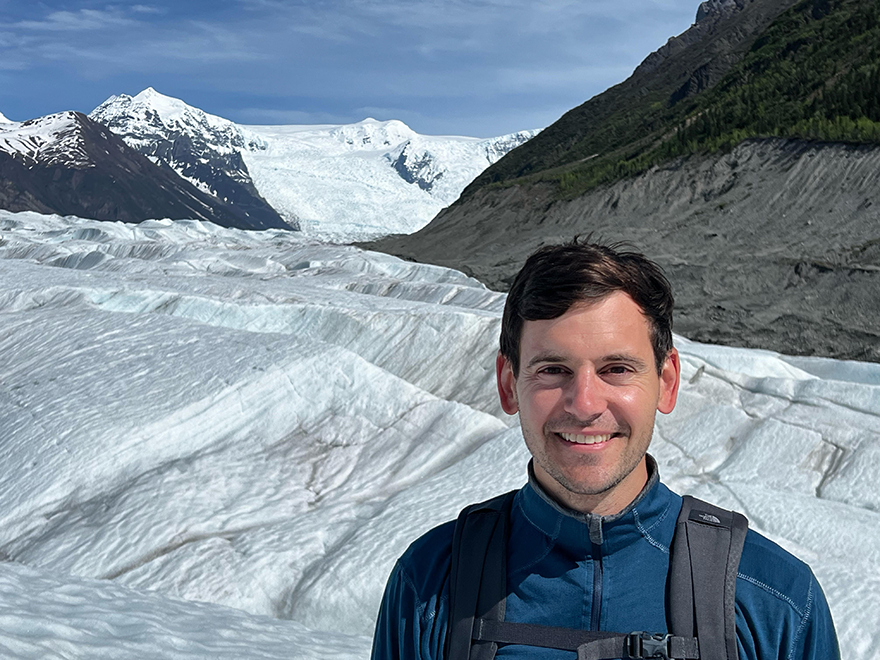Rounce receives early-career research fellowship
David Rounce was chosen for an Early-Career Research Fellowship by the National Academies of Sciences, Engineering, and Medicine to study the effects of climate change on glaciers and their contributions to regional sea-level rise, and to support the development of coastal adaptation strategies in the Gulf of Mexico.
David Rounce was chosen for an Early-Career Research Fellowship by the National Academies of Sciences, Engineering, and Medicine’s Gulf Research Program. This fellowship is part of an environmental protection and stewardship research program that seeks to improve understanding of how climate change, sea-level rise, and water quality affect ecosystems in the Gulf of Mexico. The fellowship supports early-career scientists by granting $75,000 for research and providing networking and mentorship opportunities, all toward the ultimate goal of improving the well-being of coastal communities and ecosystems.
Rounce’s research examines how glaciers respond to climate change, and how projections of regional sea-level rise can support the development of climate-resilient adaptation strategies.
“We're trying to project how the glaciers are going to respond to various warming scenarios, and then have a good understanding as to what the contributions to sea-level rise will be, and how that's going to affect sea-level rise in the Gulf,” said Rounce, and assistant professor of civil and environmental engineering.

Source: David Rounce
Rounce began his glacier research in Nepal while obtaining his doctorate. He studied how retreating glaciers form lakes that can flood downstream communities.
He currently leads a highly-interdisciplinary Gulf Research Program project that seeks to develop multiple adaptation strategies to address flooding and land loss in the Gulf, dependent on the amount of global greenhouse gas emissions. He said it is important to plan multiple courses of action, because defaulting to the worst-case scenario is not cost-effective.
“What we try to do with our research is develop probabilistic projections of regional sea-level rise and then use those projections to develop multiple adaptation strategies. Then we can start to monitor those strategies and choose the one that is most appropriate, depending on what happens in the future,” Rounce explained.
He said that because glaciers are located in isolated parts of the world, they are good indicators of climate change.
“They are responding to what's happening with our greenhouse gas emissions and the associated temperature increases,” said Rounce. “So first and foremost, they tell us what our impacts are on the natural environment.”
Even though glaciers are isolated from where most people live, they affect global water supply and contribute significantly to sea-level rise.
“Even if you're not living in the high mountains near these glaciers, if you live anywhere on the coast, the glaciers are contributing about 20% of the global mean sea-level rise. So they're a huge contributor,” Rounce explained. “Regardless of whether you live in the high mountains or on the coast, the glaciers have some impact on your life.”
Rounce began his glacier research in Nepal while obtaining his doctorate. He studied how retreating glaciers form lakes that can flood downstream communities. He eventually became interested in expanding his research to a global scale.
Regardless of whether you live in the high mountains or on the coast, the glaciers have some impact on your life.
David Rounce, Assistant Professor, Civil and Environmental Engineering
“I quickly realized that working community by community, and glacial lake by glacial lake halfway around the world wasn't really a pathway to success,” said Rounce. “So I started shifting toward global glacier modeling and trying to think about how all the glaciers in the world are changing and what the impacts associated with that are.”
Rounce looks forward to continuing his research through the fellowship.
“I’m in my early career, so it feels very humbling. I’m very honored to receive this,” said Rounce. “It is inspiring to be able to be a part of a cohort that is actively working on these challenges that we’re facing in the Gulf of Mexico.” He said networking opportunities provided through the fellowship are important for progressing work in the Gulf.
During the fellowship, he will be mentored by David Dzombak, former department head of CMU’s Department of Civil and Environmental Engineering. Rounce selected Dzombak as a mentor because of his extensive experience working with water resources and sustainability and in leading and contributing to various organizations during his career.
“Dave is also a National Academies member, and so he is very knowledgeable about that organization and can help me be more effective at the opportunities I seek and getting more involved with the National Academies moving forward,” said Rounce.
The National Academies’ Gulf Research Program was founded in 2013 in response to the 2010 Deepwater Horizon oil spill.
Pictured, top: Because glaciers are located in isolated parts of the world, they are good indicators of how the natural environment responds to climate change.
